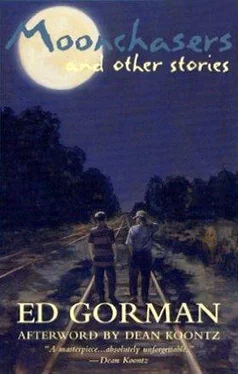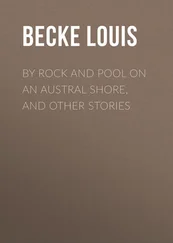“Do you think what’s happening to my father is good?”
“Of course I don’t.”
“Then you must also believe that God isn’t doing this to him — right?”
“Right.”
Richard held up the capsule. Stared at it. “All I want you to do is give me a ride to the hospital. Then just wait in the car down in the parking lot.”
“I won’t do it.”
Richard signaled for another round.
“I won’t goddamn do it,” Parnell said.
By the time they left the restaurant Richard was too drunk to drive. Parnell got behind the wheel of the new Audi. “Why don’t you tell me where you live? I’ll take you home and take a cab from there.”
“I want to go to the hospital.”
“No way, Richard.”
Richard slammed his fist against the dashboard. “You fucking owe him that, man!” he screamed.
Parnell was shocked, and a bit impressed, with Richard’s violent side. If nothing else, he saw how much Richard loved his old man. “Richard, listen.”
Richard sat in a heap against the opposite door. His tears were dry ones, choking ones. “Don’t give me any of your speeches.” He wiped snot from his nose on his sleeve. “My dad always told me what a tough guy Parnell was.” He turned to Parnell, anger in him again. “Well, I’m not tough, Parnell, and so I need to borrow some of your toughness so I can get that man out of his pain and grant him his one last fucking wish. DO YOU GODDAMN UNDERSTAND ME?”
He smashed his fist on the dashboard again.
Parnell turned on the ignition and drove them away.
When they reached the hospital, Parnell found a parking spot and pulled in. The mercury vapor lights made him feel as though he were on Mars. Bugs smashed against the windshield.
“I’ll wait here for you,” Parnell said.
Richard looked over at him. “You won’t call the cops?”
“No.”
“And you won’t come up and try to stop me?”
“No.”
Richard studied Parnell’s face. “Why did you change your mind?”
“Because I’m like him.”
“Like my father?”
“Yeah. A coward. I wouldn’t want the pain, either. I’d be just as afraid.”
All Richard said, and this he barely whispered, was “Thanks.”
While he sat there Parnell listened to country western music and then a serious political call-in show and then a call-in show where a lady talked about Venusians who wanted to pork her and then some salsa music and then a religious minister who sounded like Foghorn Leghorn in the old Warner Brothers cartoons.
By then Richard came back.
He got in the car and slammed the door shut and said, completely sober now, “Let’s go.”
Parnell got out of there.
They went ten long blocks before Parnell said, “You didn’t do it, did you?”
Richard got hysterical. “You sonofabitch! You sonofabitch!”
Parnell had to pull the car over to the curb. He hit Richard once, a fast clean right hand, not enough to make him unconscious but enough to calm him down.
“You didn’t do it, did you?”
“He’s my father, Parnell. I don’t know what to do. I love him so much I don’t want to see him suffer. But I love him so much I don’t want to see him die, either.”
Parnell let the kid sob. He thought of his old friend Bud Garrett and what a good goddamn fun buddy he’d been and then he started crying, too.
When Parnell came down Richard was behind the steering wheel.
Parnell got in the car and looked around the empty parking lot and said, “Drive.”
“Any place especially?”
“Out along the East River road. Your old man and I used to fish off that little bridge there.”
Richard drove them. From inside his sport coat Parnell took the pint of Jim Beam.
When they got to the bridge Parnell said, “Give me five minutes alone and then you can come over, OK?”
Richard was starting to sob again.
Parnell got out of the car and went over to the bridge. In the hot night you could hear the hydroelectric dam half a mile downstream and smell the fish and feel the mosquitoes feasting their way through the evening.
He thought of what Bud Garrett had said, “Put it in some whiskey for me, will you?”
So Parnell had obliged.
He stood now on the bridge looking up at the yellow circle of moon thinking about dead people, his wife and many of his WWII friends, the rookie cop who’d died of a sudden tumor, his wife with her rosary-wrapped hands. Hell, there was probably even a chance that nurse from Enid, Oklahoma, was dead.
“What do you think’s on the other side?” Bud Garrett had asked just half an hour ago. He’d almost sounded excited. As if he were a farm kid about to ship out with the Merchant Marines.
“I don’t know,” Parnell had said.
“It scare you, Parnell?”
“Yeah,” Parnell had said. “Yeah it does.”
Then Bud Garrett had laughed. “Don’t tell the kid that. I always told him that nothin’ scared you.”
Richard came up the bridge after a time. At first he stood maybe a hundred feet away from Parnell. He leaned his elbows on the concrete and looked out at the water and the moon. Parnell watched him, knowing it was all Richard, or anybody, could do.
Look out at the water and the moon and think about dead people and how you yourself would soon enough be dead.
Richard turned to Parnell then and said, his tears gone completely now, sounding for the first time like Parnell’s sort of man, “You know, Parnell, my father was right. You’re a brave sonofabitch. You really are.”
Parnell knew it was important for Richard to believe that — that there were actually people in the world who didn’t fear things the way most people did — so Parnell didn’t answer him at all.
He just took his pint out and had himself a swig and looked some more at the moon and the water.
In the mornings now, the fog didn’t burn off till much before eight, and the dew stayed silver past nine, and the deeper shadows stayed all morning long in the fine red barn I’d helped build last year. The summer was fleeing.
But that wasn’t how I knew autumn was coming.
No, for that all I had to do was look at the freckled face of my granddaughter, Lisa, who would be entering eighth grade this year at the consolidated school ten miles west.
For as much as she read, and when she wasn’t doing chores she was always reading something, even when she sat in front of the TV, she hated school. I don’t think she’d had her first serious crush yet, and the girlfriends available to her struck her as a little frivolous. They were town girls and they didn’t have Lisa’s responsibilities.
This particular morning went pretty much as usual.
We had a couple cups of coffee, Lisa and I, and then we hiked down to the barn. It was still dark. You could hear the horses in the hills waking with the dawn, and closer by the chickens. Turn-over day was coming, a frantic day in the life of a farmer. You take the birds to market and then have twenty-four hours to clean out the chicken house before the new shipment of baby chicks arrives. First time I ever did it, I was worn out for three days. That’s when my daughter, Emmy, read me the Booker T. Washington quote I’d come to savor: “No race can prosper till it learns that there is as much dignity in tilling a field as writing a poem.” Those particular words work just as well as Bengay on sore muscles. For me, anyway.
The barn smelled summer sweet of fresh milk. Lisa liked to lead the animals into the stalls; she had her own reassuring way of talking to them in a language understood only by cows and folk under fourteen years of age. She also liked to hook them up.
Читать дальше












